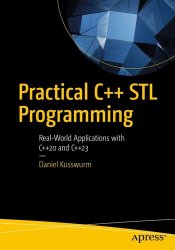 Название
Название: Practical C++ STL Programming: Real-world Applications With C++20 and C++23
Автор: Daniel Kusswurm
Издательство: Apress
Год: 2024
Страниц: 933
Язык: английский
Формат: True PDF, True EPUB
Размер: 11.4 MB
Learn how to use the classes, algorithms, and other programming constructs of C++ STL. This comprehensive and practical guide covers a broad range of STL programming topics and highlights numerous programming constructs from the C++20 and C++23 standards.
Mastering use of STL can be daunting for both new and experienced C++ programmers. It doesn’t help that the ISO C++ specification documents are meticulous and verbose. This book is organized to help you quickly understand C++ STL programming, focusing on the real-world aspects of its usage. Rather than spend time providing extensive explanations of the inner workings of STL, author Daniel Kusswurm judiciously explores these intricacies only when they advance the reader’s understanding of a particular topic.
This book is accompanied by over 100 source code examples, designed to accelerate learning by emphasizing practical use cases. It coincides with the C++20 and C++23 standards and works with any OS platform that supports these standards including Windows (Visual C++), Linux (GNU C++) and macOS (clang). After reading Practical C++ STL Programming, you’ll be able to exploit the computational capabilities of STL to implement a wide variety of software algorithms and solve unique programming challenges.
Practical C++ STL Programming is an instructional text that teaches you how to successfully apply STL’s classes, algorithms, and other programming constructs. It covers a wide range of STL topics, including many new elements from the C++20 and C++23 standards. Before continuing, it warrants mentioning that it’s utterly impractical for one book to completely explain every STL component. This book emphasizes practical C++ STL programming. By that I mean it teaches you how to properly apply what I believe are STL’s most essential and worthwhile classes and algorithms. The specific topics covered in this book along with its numerous source code examples are designed to accelerate comprehension of STL in general and motivate further study.
What You Will Learn:
Explore STL capabilities, including how to generate formatted output, utilize sequence containers, apply utility classes, exploit smart pointers, manipulate associative containers, and exercise container adaptors.
Apply algorithms and iterators to perform a wide variety of container operations including sorts, searches, insertions, removals, and erasures.
Utilize ranges and range iterators, adaptors, views, compositions, projections, and factories.
Perform file and directory operations using STL’s file system classes.
Execute chronological calculations and formatting using the time classes.
Employ STL’s random number generation and distribution classes.
Implement numerical processing algorithms using STL’s std::valarray and std:complex classes.
Accelerate program performance using STL’s concurrency classes and algorithm execution policies.
Who This Book Is For:
Software developers and programmers who understand the basic syntax and semantics of C++ and want/need to learn how to use STL’s classes and algorithms, or programmers who have experience using STL as specified by the C++11/14/17 standards and are interested in learning how to use the new STL classes and algorithms of C++20/23. Computer science/engineering students or hobbyists who want to learn about or better understand the capabilities of STL. Previous experience with at least one of the C++ compilers mentioned in the “Source Code” section will also be helpful.
Скачать Practical C++ STL Programming: Real-world Applications With C++20 and C++23
[related-news]
[/related-news]